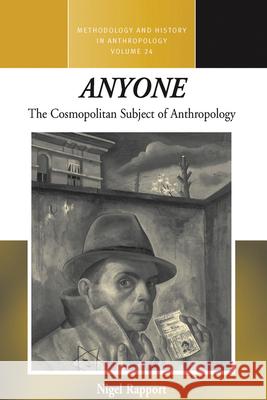Anyone: The Cosmopolitan Subject of Anthropology » książka
Anyone: The Cosmopolitan Subject of Anthropology
ISBN-13: 9780857455192 / Angielski / Twarda / 2012 / 238 str.
Anyone: The Cosmopolitan Subject of Anthropology
ISBN-13: 9780857455192 / Angielski / Twarda / 2012 / 238 str.
(netto: 482,14 VAT: 5%)
Najniższa cena z 30 dni: 498,70
ok. 22 dni roboczych.
Darmowa dostawa!
The significance that people grant to their affiliations as members of nations, religions, classes, races, ethnicities and genders is evidence of the vital need for a cosmopolitan project that originates in the figure of Anyone - the universal and yet individual human being. Cosmopolitanism offers an alternative to multiculturalism, a different vision of identity, belonging, solidarity and justice, that avoids the seemingly intractable character of identity politics: it identifies samenesses of the human condition that underlie the surface differences of history, culture and society, nation, ethnicity, religion, class, race and gender. This book argues for the importance of cosmopolitanism as a theory of human being, as a methodology for social science and as a moral and political program.
This is an elegantly written and well-organised book on a subject whose star continues to rise. Those who are familiar with Rapports project will be anticipating its publication with some excitement. Those who are not familiar with his work are in for a treat in that this is the culmination of his work so far... He is an exceptional essayist and although each chapter might stand alone, together they form a considerable contribution which is significant both in terms of the theoretical and moral advance of the discipline. · Peter Collins, Durham UniversityThe book is one of the first full-length monographs on the cosmopolitan project in anthropology, and should draw a wide readership...[It]is well researched and brings together a wealth of important scholarly sources. Readers stand to learn much from the discussion. · Lisette Josephides, Queens University BelfastThe significance that people grant to their affiliations as members of nations, religions, classes, races, ethnicities and genders is evidence of the vital need for a cosmopolitan project that originates in the figure of Anyone - the universal and yet individual human being. Cosmopolitanism offers an alternative to multiculturalism, a different vision of identity, belonging, solidarity and justice, that avoids the seemingly intractable character of identity politics: it identifies samenesses of the human condition that underlie the surface differences of history, culture and society, nation, ethnicity, religion, class, race and gender. This book argues for the importance of cosmopolitanism as a theory of human being, as a methodology for social science and as a moral and political program.Nigel Rapport is Professor of Anthropological and Philosophical Studies at the University of St. Andrews, where he directs the Centre for Cosmopolitan Studies. He has also held a Canada Research Chair in Globalization, Citizenship and Justice. He is a Fellow of the Royal Society of Edinburgh.











